Member Directory,
1847 - 1922
Philip Schaff
Theologian
Centurion, 1877–1893
Roswell D. Hitchcock and Frederick A. P. Barnard
Chur, Switzerland
New York (Manhattan), New York
Age fifty-eight
Bronx, New York
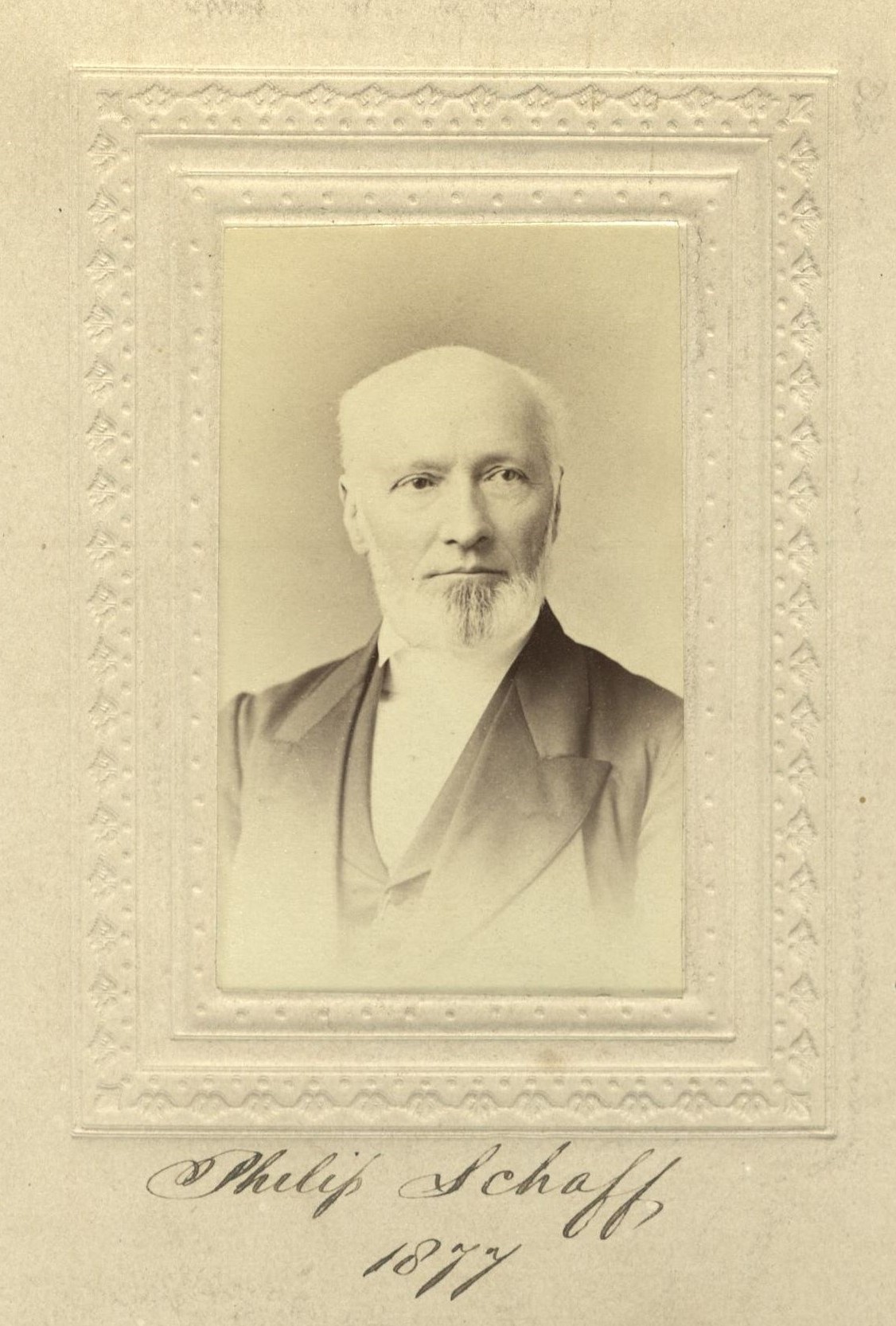
Century Memorials
Philip Schaff was one of the greatest theologians of his time. His devotion to the interests of the church and to the cause of Christianity, covering without intermission a period of more than fifty years; his learning, industry and ability as a lecturer and writer on theological subjects, won him recognition and the highest ecclesiastical titles and honors throughout the Christian world.
Born in Switzerland in 1819, and receiving his education at several prominent German Universities, he came to the country of his adoption in 1843, where he has lived and labored ever since. During this time he enriched the world with many notable works, the list of which contains eighty-five titles, and one of which covers twenty-five volumes, another fourteen, another seven, and others three and four. Prominent among them are his “Creeds of Christendom” and his “Church History,” the latter pronounced by the faculty of the University of Berlin to be “the most notable monument of universal historical learning produced by the school of Neander.”
For the advancement of Biblical learning few men have done so much as he. Besides editing and contributing to various Scripture commentaries, he published a Bible dictionary; and at the request of the English Revisers, he organized the American Bible Revision Committee, and served as its President until its labors were completed. His work in this department alone insures him a permanent place in the memory of English-speaking Christians.
His marvelously tenacious memory, which gave him ready command of immense sources of learning; his great critical sense and constructive faculty; his broad liberal spirit, which emancipated him from the evil effects of prejudice and bigotry; united with love of work, and the regularity, persistence and scrupulousness of his German habits and methods of study, rendered him peculiarly fitted for the work of the historian. He was a universal scholar; a student of Dante; familiar with the best Greek and Latin authors; and seemed to have exhausted the literature of any subject that he treated.
And with all this varied store of learning, to us who knew him here, he was as simple as a child. Around his person there was a genial glow of light and warmth that made him the most delightful of companions. His sunny temperament, unfailing fund of wit and anecdote, his contagious enthusiasm, his utter want of self-consciousness, and the magnetism of his scholarly mind, left an indelible impression upon all of us whose privilege it was to enjoy his association and friendship.
It is a melancholy reflection that the volume of such a life is closed; and we may truly say of him, as was said of the old New England preacher, John Cotton, in 1643: “He was in truth a living Bible endowed with breath, where the two covenants were inscribed; the gospel and the law had each a volume on his heart; his head was the index of the holy volume; his name the title, and his life a commentary on the text. Oh! what a worthy and precious moment when he shall reappear in a new edition, without errata; he will then be rebound for eternity.”
Henry E. Howland
1894 Century Association Yearbook
Fellow Members of The Century:
It has always been the aim of our Association to keep in touch with men who have done good service and have won deserved distinction in any department of letters, art or science; and very much of the pleasure and intellectual stimulus which, in the minds of all of us, attach to The Century, is due to our familiar intercourse with such in the retirement and freedom of these halls. It is, accordingly, fitting that when they have passed away from our circle, we should pay some tribute to their memory; and therefore it is that I am honored by the invitation of the Committee on Literature to address you concerning our venerable and honored comrade who has so recently left us—The Reverend Dr. Philip Schaff. If I do not bring to this task qualifications worthy of the subject, I may at least claim some right to speak of him from the position of a professional colleague and a warm personal friend.
I am confident that I am not alone in the sense of loss which comes to me every time I enter these rooms and miss the presence of the dear old Doctor. For this was one of his favorite haunts; and his face and form have become to many of us as familiar as the old portraits on the walls. There is a ministerial society in this city, which, for over fifty years, has regularly assembled on Saturday afternoons, adjourning about six o’clock, and of which he was a member; and it was his habit to go directly from it to The Century, where we have all been accustomed to see him, quietly enjoying his cigar, buried in a book or magazine, or engaged in conversation.
I shall not be at pains to combat the impression which prevails in not a few minds that theologians, as a class, are narrow men, affiliating only with those of their own guild. That Theology is sometimes represented by men of contracted sympathies, short intellectual outlooks and unsocial habits, is as true as that men of the same type are to be found among the representatives of other professions. It is enough to say that our old friend was not of that number. His social instincts were strong, and his catholicity was no less literary than religious. He liked and sought the society of men of all nations, all professions, and all creeds. He cultivated associations on lines apart from his own specialties. He was a genial and engaging companion, no less than a learned theologian, a devout Christian and a ripe scholar. Indeed it is that breadth, that catholicity, that many-sided intelligent sympathy which furnishes the key to his wide reputation, and, in a very important sense, to his character and work. He has filled a very large, important and conspicuous place in the history of Christian teaching in this country during the last fifty years—a period the more significant because so largely formative. His office has been that of a mediator between a great influx of fresh thought, and a sharply-crystallized, and not always enlightened, mass of religious opinion and conviction. To him it has been largely due that a broader learning and a bolder and more independent thinking are fast becoming at home amid conditions where they originally appeared as dangerous novelties, were eyed with suspicion, or fought with the dogged persistence of ignorance.
For such an office he was shaped by his early environment and training. Born in republican Switzerland, his youth was cast in a political mould which prepared him for the position of a teacher and of a citizen in America. Neither his literary nor his religious pursuits made him unintelligent or unsympathetic as to the political conditions of his adopted country. Along with the study of the religious aspects of American society, went the study of its political problems, especially as related to the vast incoming tide of foreign populations. As early as 1846 he published, in German, an address delivered at Chambersburg, Pennsylvania, entitled “Anglogermanismus,” in which he predicted for the United States the greatest significance for the future development of both secular and religious history. “By this,” he says, “we would by no means affirm that Europe has run out the course of its life. Rather, it is still the proper centre of history in all its departments. * * * But History proceeds with wonderful foresight. It prepares the soil for its future developments long before it abandons its earlier field of action. But there is no want of convincing signs that the stream of history is in reality directing its course more clearly every day from the Old to the New World.” Again, in 1854, he published, also in German, a volume entitled “America,” in which the political, social and religious conditions of the United States were discussed with special reference to the Germans. The list of his works contains several similar productions, and his treatment of American institutions in the light of his wide historical knowledge and personal acquaintance with both the old and the new civilizations, was directed to prepare the stranger for the intelligent assumption of American citizenship.
From Switzerland he went to Germany in order to pursue his academic studies, which he carried on at Tübingen, Halle and Berlin. From the University of Berlin he received his degree of Licentiate in Theology at the age of twenty-two, and the appointment of privat-docent one year later. Among his teachers were some of the greatest in Germany, representing various phases of religious thought and criticism. He sat at the feet of the sternly orthodox Hengstenberg and of the Hegelian Baur. He felt the inspiration of the brilliant and versatile Tholuck, and of Neander’s learning and historic spirit. He listened to Dorner, Twesten and Ranke.
He entered upon his career at a significant crisis in German thought, the results of which were destined to be felt a few years later in both England and America. It was the beginning of a recoil from traditional dogmatism, and of a freer, and in some aspects, a more scientific handling of Christian history and Christian documents.
This movement, inaugurated by Semler of Halle, only six years before Kant startled the philosophic world with his “Critique of Pure Reason,” was carried on by Schleiermacher and his school, and culminated in a revolution in the methods of historic criticism which was developed upon two divergent lines by Neander of Berlin, and Ferdinand Christian Baur of Tübingen. Baur, a disciple of Hegel, with his vast learning, keen historic consciousness, and masculine grasp of historic problems, treated Christian history as a purely natural evolution. Neander, with equal learning and an equally acute historic sense, treated Christian history as a development under supernatural forces. Schaff attended the lectures of both, and was in the very heart of the tempest raised by Strauss; but he was repelled by the negative results of Baur’s criticism, and attached himself to the school of Neander. The extent of Neander’s influence upon him appears from the letter of congratulation which the Berlin faculty addressed to him last year on the completion of his fifty years of teaching, in which they declare that his Church History is the most notable monument of historical learning produced by the school of Neander.
At this time the touch of the great German schools had scarcely been felt in the United States; but the wave of the new criticism was mounting and moving westward, and men like Philip Schaff and Henry Boynton Smith were being trained in those schools to keep steady hands on the flood gates through which, a little later, the tide of German thought came pouring into the square enclosures of New England metaphysics and theology.
Only a year after he had begun lecturing in Berlin, he was invited, on the joint recommendation of Tholuck, Neander and Julius Müller, to a professorship in the Theological Seminary of the German Reformed Church at Mercersburg, Pennsylvania. Two delegates were sent to Berlin to convey the invitation, and their mission excited considerable attention by the prospect which it appeared to open of transporting German theology to America. King Frederick William IV. entertained them at the palace, and made a gift of money to the American Seminary.
At Mercersburg Dr. Schaff remained for twenty years—from 1843 to 1863. Almost immediately he began that course of literary labors which was terminated only by his death. His discretion was shown in his not attempting to transplant German thought and learning without adaptation to the conditions of a free church and a free state. The popular impression in the religious circles of America was that Germany was a hotbed of chaotic speculation and of positive heresy in all matters of religion. “German rationalism” was an oracular cant phrase in the current religious vocabulary, employed with the same intelligence and discrimination which attach to the term “Higher Criticism” at the present day. Dr. Schaff did not escape the effects of this prejudice; and his welcome to the bosom of American theology was an arraignment for heresy, founded upon his inaugural address at Mercersburg. Of this he says: “I made a German address in self defence; but as it was not generally understood, I had to attempt another speech in broken English, which was much shorter, but more effective. So much for being brief and speaking English.”
After the battle of Gettysburg the Seminary building at Mercersburg was converted into a military hospital, and in 1863 Dr. Schaff removed to New York. During six years his services were in constant demand as a theological lecturer in different institutions, and in 1869 he entered upon his work in Union Theological Seminary in this city, where he held successively the chairs of Symbolics and of Biblical Literature, both Hebrew and Greek, until in 1887 he was finally transferred to the chair of Church History, which, as Acting Professor and Professor Emeritus, he continued to occupy until his death. Two members of the Century Association, whose memory is still fragrant among us, were his colleagues in that Faculty—Dr. William Adams and Dr. Roswell D. Hitchcock.
Along with the duties of his chair he carried on a series of labors, a tithe of which would have overtaxed the energies of most men. Besides acting as Corresponding Secretary of the Evangelical Alliance, and as officer and member of other societies, the duties of which involved repeated journeys to Europe, he went in 1886 as a delegate to the fifth centennial of the University of Heidelberg, and in 1888 to the eighth centennial of the University of Bologna.
The work of revising the English Bible was inaugurated by the Convocation of Canterbury in the beginning of 1870, and the coöperation of American scholars was formally solicited not long after. Dr. Schaff was the chairman of the American committee, and during the fifteen years of the prosecution of the work he never relaxed his activity, either in the work of revision itself or in the adjustment of the difficult practical and international questions which sometimes attended it. The long table at which the committee sat in his library at the Bible House, with a silver plate marking the name and place of each translator, is carefully preserved in the Museum at Union Seminary. It was a notable array which gathered round that table with him—Theodore Woolsey, Ezra Abbot, Howard Crosby, James Hadley, Timothy Dwight, Tayler Lewis, Edward A. Washburn, and others, so many of whom are gone with him.
What a factory that double room at the Bible House was. His library was there, and several assistants were constantly at work under his eye. Proofs were coming and going, encyclopaedias, histories and commentaries were being rummaged, critical questions were being discussed, and he himself was in his corner, busied now with a proof, now with a chapter of the Church History, now with an article for the new Encyclopaedia, now with a communication to the English revisers. The sum total of his literary activity represented merely in paper and type is prodigious. The catalogue of his works, original and edited, contains eighty-four titles, of which half have appeared since 1863. The original works include the Church History in its revised form, seven octavo volumes, averaging eight hundred pages each, and the “Creeds of Christendom,” three volumes, containing in all nearly twenty-five hundred octavo pages. Not a few of his works were multiplied by translations. One of them passed into at least seven languages, including Russian, Bulgarian and Japanese. Another appeared in Nestorian, Arabic and Chinese. The first three volumes of the Church History were translated into Chinese and Hindustani, and, in an abridged form, into Italian.
Added to these is the long list of works which he edited. The catalogue since 1863 numbers twenty-two titles, among which are a Commentary on the entire Bible forming twenty-five large volumes, the Schaff-Herzog Encyclopaedia in three thick quartos, and a Library of the Nicene and post-Nicene Fathers in fourteen volumes.
It might seem invidious to single out from Dr. Schaff’s numerous works any one as that upon which his reputation is most likely to rest; but it is safe to say that his own choice would have fallen upon his Church History. The testimonies to the value of this work are both numerous and weighty, and come from both sides of the Atlantic. I have already cited the strong encomium of the Faculty of the University of Berlin; and there has been placed in my hands a letter received last week from the venerable Professor Godet of Neuchatel, one of the leading Biblical scholars of Europe, from which I am permitted to quote the following extract concerning this work:
“I admire, more than I can express, the copiousness, the precision, the sureness, the verbal accuracy of this great work. Beside such knowledge I feel myself ignorant, and feeble in the presence of such power of execution. What a treasure of facts and of wise and just judgments! It seems as if this immense work might be enough for the life of one man; and when one thinks of all he has produced in addition—it is, to me, incomprehensible.”
The same friend who has so kindly furnished me with this letter, has also called my attention to the following words of Edward Freeman, who, as we all know, was not wont to err on the side of excessive leniency of literary judgment, or of excessive commendation of any book which he might condescend to notice at all.
“Dr. Schaff presents a connected history of all the great movements of thought and action in a pleasant and memorable style. His discrimination is keen, his courage undaunted, his candor transparent. He has produced what we have no hesitation in pronouncing the history of the Church.”
The long catalogue testifies to the encyclopaedic character of Dr. Schaff’s mind, and to the variety and wide range of his scholarship. Besides Church history and Biblical interpretation, which were his specialties, we find monographs on the social and political conditions of the United States, biographies, lectures and essays on Dante, catechisms and hymnals for children, manuals of sacred song, travels, essays on literature and poetry, and editions of the Fathers. A student once asked him how he had succeeded in accomplishing so much. He replied: “One must get up early, sit up late, and keep awake all day.” But the secret did not lie only in the husbanding of minutes. It lay also in his intense concentration. Whatever he might be engaged upon—whether the creeds of Christendom, the story of Dante and Beatrice, or the myth of Luther’s suicide, he was totus in illis. If you came upon him in his study, you would find him bending over his book or manuscript, apparently with all the blood in his body mounted to his brain, and as he lifted his flushed face, it seemed as though he must travel back from the first or second century, from Ephesus or Corinth or Nicaea, before he could fairly realize your presence. Work was his element, out of which he was as ill at ease as a fish out of water. He had the real German habits and methods of study—the regularity, the scrupulousness, the minuteness, the deliberation, the aversion to taking things at second hand.
His mind could hardly be called original in the highest sense of that term. It was acquisitive, combinative, judicial. He propounded no new philosophy: his style was not unique or startling. He had little or none of the power to make an old truth seem new by “the art of putting things.” His historical method was not novel; but on the other hand, he was far from being a mere compiler of other men’s labors. He worked from original sources; his large learning was cleanly classified and massed, and his judgments were independent. He was a man of definite and positive convictions, and a formidable antagonist to any one who assailed them. He was no mere arsenal of literary ammunition. He valued learning for its uses, and what he knew he kept moving. He put into the hands of English readers the sifted results of a vast mass of German scholarship. Nor was his work addressed to scholars alone. He had constantly in view the popular need; and not a little of his work is in circulation to-day in places where the atmosphere and the language of the schools are alike unknown.
The historical spirit pervaded all his methods of handling truth. He was profoundly religious in the best sense of that word. His reverence was as deep as his outlook was broad; but he was totally without cant, and he would never wrench a Biblical truth out of its historical setting in order to stop a gap in a dogmatic system. He acted upon the principle that it is the first business of an interpreter to let his author say what he does say, instead of attributing to him what he thinks he ought to say. He was true to his convictions, never afraid to face their logical consequences, never afraid to acknowledge a difficulty and to give it its full weight. He loved and desired truth above all things; and if a truth shattered his own conclusions, he welcomed it, if he were only convinced that it was truth. He was never afraid to say what he believed. I saw him once in a position where very much was at stake, where his silence would have called forth no remark, where I am not sure indeed that his breaking silence did not cause surprise; and I shall never forget how he rose, every nerve quivering with excitement, and with a trembling voice said: “I am troubled in my conscience about this thing.”
He loved to teach, whether by word or pen. One of his hardest trials, consequent upon his first paralytic stroke, was his inability to lecture. He measured every stage of his improvement by the degree in which it shortened the distance between him and the lecture-room, and it was with a boyish glee, and almost with a shout, that he announced, “I am going to lecture next week.” With all his scholastic habits he was no recluse. No man more thoroughly enjoyed the raciness and fun of social chat. He always had an appreciative laugh for a good story, and was ready to match it with another of his own. Some of his jokes have passed into the traditions of the Seminary. In his public utterances he was habitually serious; but he has been known, at the beginning of a weighty speech in a great deliberative body, to turn and direct the current of feeling by a happy witticism.
He had a remarkable memory. It could not be said of him, as it was of one of his former colleagues, that he had forgotten more than most men knew, for he never seemed to have forgotten anything, whether it were a date, a name somewhere back in an early century, or an incident of an interview with Neander or Abraham Lincoln. His memory was richly stored with poetry—with hymns, Latin, German and English, with Homer and Dante. He would repeat passages of the Odyssey, of the Divina Commedia and Faust. He was a student of Dante, and published several essays on the Florentine poet and his age. He had a wonderful acquaintance with the literature of any subject which he discussed, and, in answer to a question, would usually indicate, out of hand, the position and attitude of any representative in a great mass of authorities. He seemed to have some special organ of vision which kept him constantly aware of every new sail on the critical horizon. How familiar we of the Seminary are with such a little scene as this: The gong is sounding for lecture. His white head emerges from the library, and he comes down the passage with his note-book under his arm. “Good morning, Doctor.” “Good morning. How are you? Oh, have you seen that new book of Carl Clemen on the Chronology of the Pauline Epistles? Rather trashy, isn’t it? Not much light on the sources of the Acts. Speaking of Acts, that’s a strong book of Ramsay’s.” The gong has stopped; the students are crowding in. The Doctor begins to move toward the lecture room, still talking. “Did you know that the first volume of Godet’s ‘Introduction’ is out at last? A great thing for a man in his eightieth year! Ah! I saw him in Neuchatel a year ago.” And then an anecdote, a criticism, a quotation, and he disappears through the lecture-room door.
He always retained a foreign accent. German was his native tongue, and he spoke, of course, readily in French, and said that he used to know Italian, but had grown rusty; but he had a thorough command of English. He rarely used notes in his public addresses, and his extempore utterance was at once fluent and accurate.
He spent a large part of last Summer at Lake Mohonk, which, for several years, had been one of his favorite resorts. It was there that he had been smitten with his first paralytic stroke, just a year before; and though still suffering from its effects, he was able to enjoy his favorite walks and the society of his numerous friends. An old habitué of the house, he was a marked figure, and an object of general esteem and affection. The mellowness of the old scholar’s spirit was a delightful portent of the speedy dropping of the ripened fruit. His talk on his familiar themes was rich and varied, and his reminiscences vivid and racy of the companions and masters of his earlier studies in Germany. His love of work asserted itself in defiance of all cautions and remonstrances. Often one came upon him in some snug corner or sunny nook, deep in the page before him, it might be a story, or the latest proof sheet of his forthcoming volume. He had just received the first imported copy of Von Gebhardt’s “Gospel and Apocalypse of Peter,” with photographic fac-similes of that strange and interesting document, and no child could be more delighted with a new gun or drum. He showed the volume to everybody, and talked about it to people who probably knew no more about the Gospel of Peter than about the ichthyosaurus; but it was his way to try and interest his companion, whoever he might be, in his own literary pleasures, and the guests would have listened if the Doctor had discoursed on Egyptian hieroglyphics or the original language of the Muratorian Canon. He could not let his work alone. For him to stop working was to stop living. He never, while he lived, reached a point where he did not see new work before him, and he never lost his eagerness to do it. He was correcting the proofs of his new volume, developing his paper for the Congress of Religions at Chicago, and looking forward with eager delight to his course of lectures in the Seminary.
But the end was very near. He went to Chicago, and his paper on the Unity of Christendom was read at the Congress of Religions, but not by himself. The excitement and fatigue were too much for his strength. I believe his last appearance in public was at Union Seminary, the last week in September, at the inauguration of Professor McGiffert, his pupil and chosen successor in the chair of Church History. Soon after came an attack of his old enemy, angina pectoris, followed by a second paralytic shock, and on the twentieth of October he peacefully ended his long, busy and fruitful career, coming to his grave in a full age, “like as a shock of corn cometh in in his season.”
There has thus passed away from us a ripe and learned scholar and a genial Christian gentleman; and I may be allowed to say, finally, that over and above the conceded value of his literary work, perhaps his chief claim to distinction rests upon his magnificent catholicity—upon that rare combination of uncompromising loyalty to conviction with a temper and ministry thoroughly irenic. Qualified by his learning and eminence to be a partisan leader, he was everywhere recognized as a mediator. Amid the innumerable division-lines which cross the area of religious thought and faith, nursed in the very cradle of critical controversy, with a knowledge of theological cleavage-lines such as few men possess, with definite and well-matured convictions and preferences of his own—he none the less discerned truth and good everywhere, and respected them wherever he found them. He emphasized points of contact and union rather than points of difference; he sought conciliation rather than controversy.
Enshrined in the admiring recognition of the best minds of America and Europe, cherished in the memory of a host of loving friends, stamped upon the scholarship and work of hundreds of pupils, and departing this life in peace with God and in charity with all mankind—he rests from his labors, and his works do follow him.
Marvin R. Vincent
1894 Century Association Yearbook
Related Members
Member Directory Home-
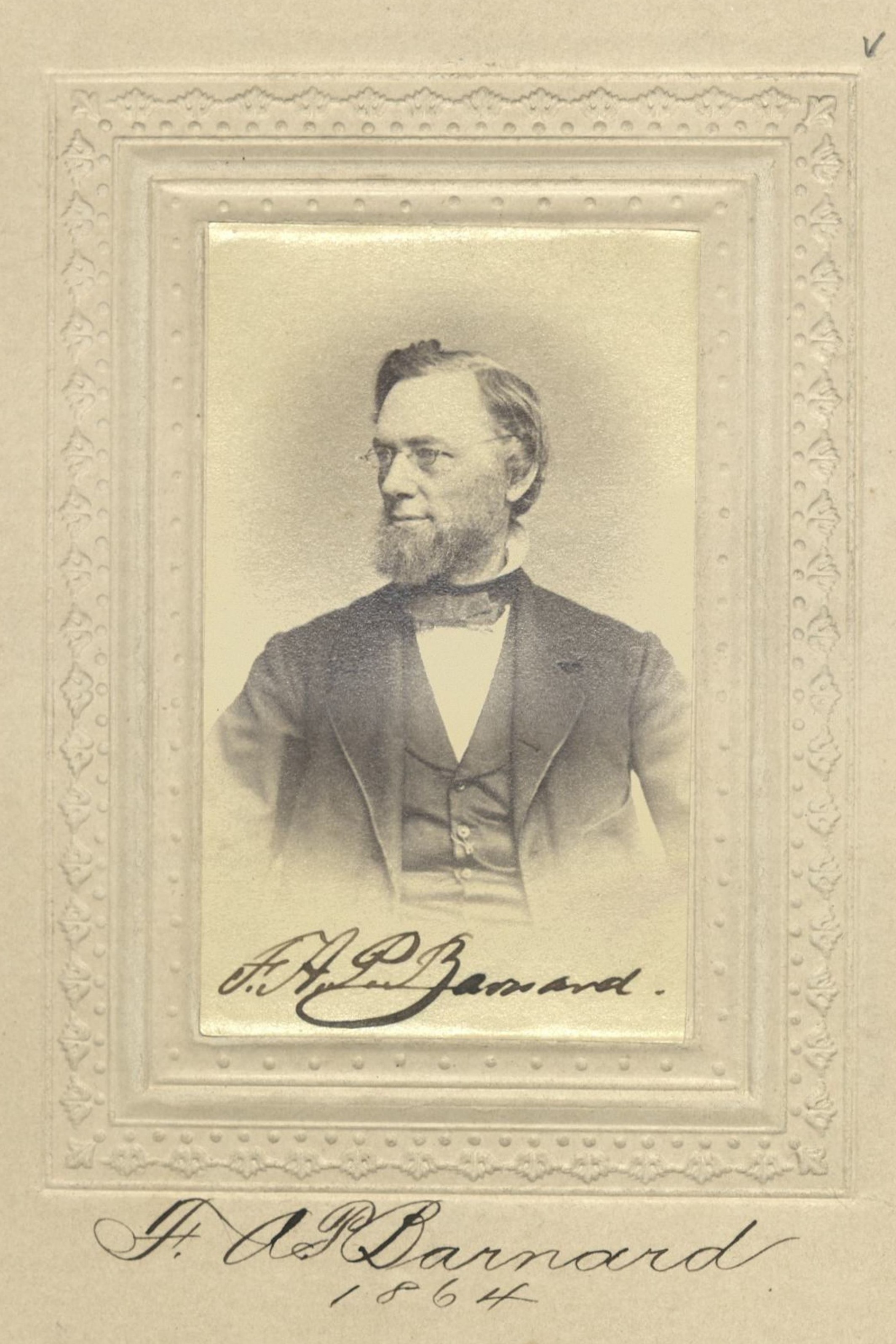 Frederick A. P. BarnardPresident, Columbia CollegeCenturion, 1864–1889
Frederick A. P. BarnardPresident, Columbia CollegeCenturion, 1864–1889 -
 Charles A. BriggsProfessor, Union Theological SeminaryCenturion, 1893–1913
Charles A. BriggsProfessor, Union Theological SeminaryCenturion, 1893–1913 -
 Edward L. ClarkClergymanCenturion, 1882–1893
Edward L. ClarkClergymanCenturion, 1882–1893 -
 Cornelius C. CuylerBankerCenturion, 1893–1909
Cornelius C. CuylerBankerCenturion, 1893–1909 -
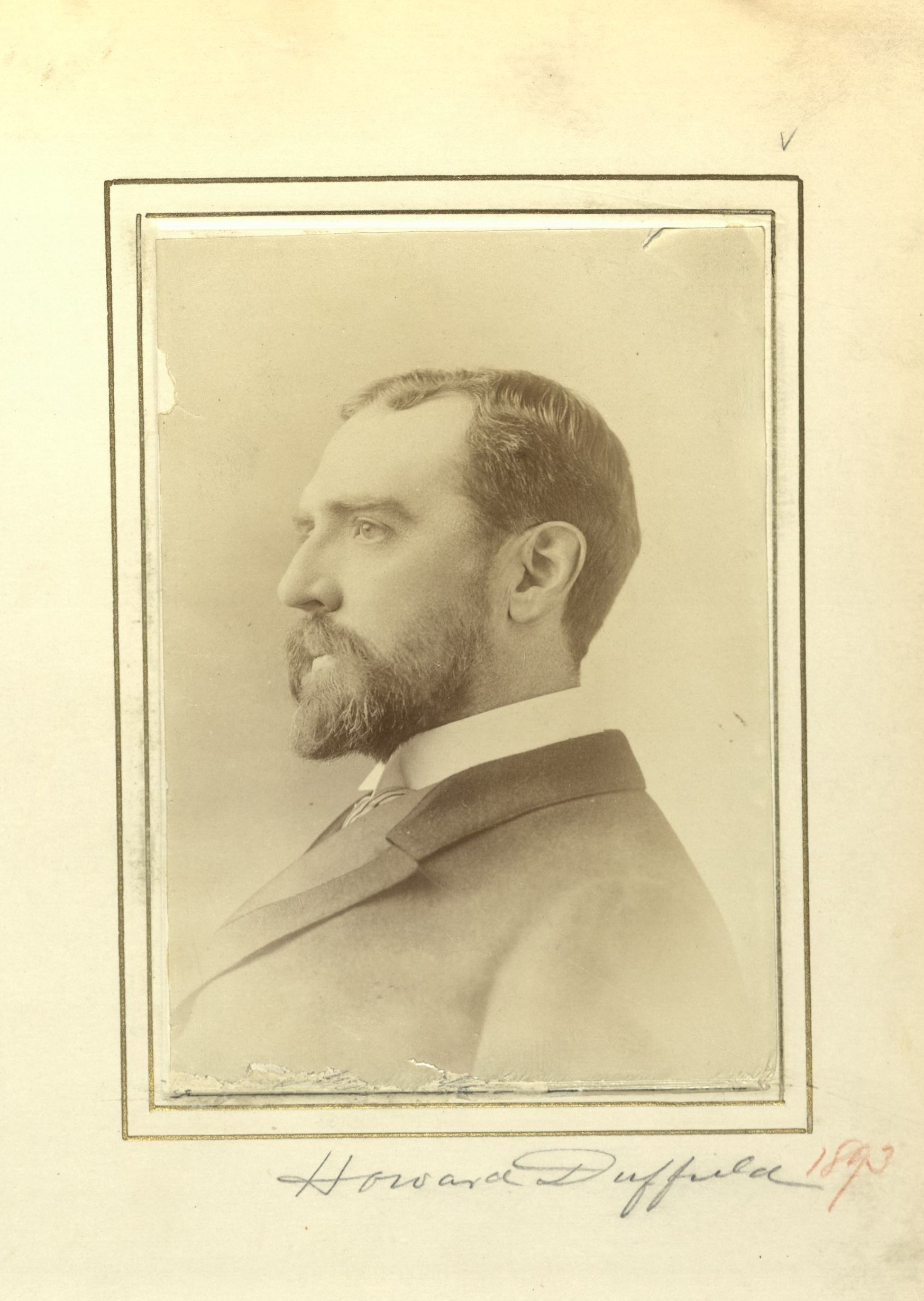 Howard DuffieldClergymanCenturion, 1893–1941
Howard DuffieldClergymanCenturion, 1893–1941 -
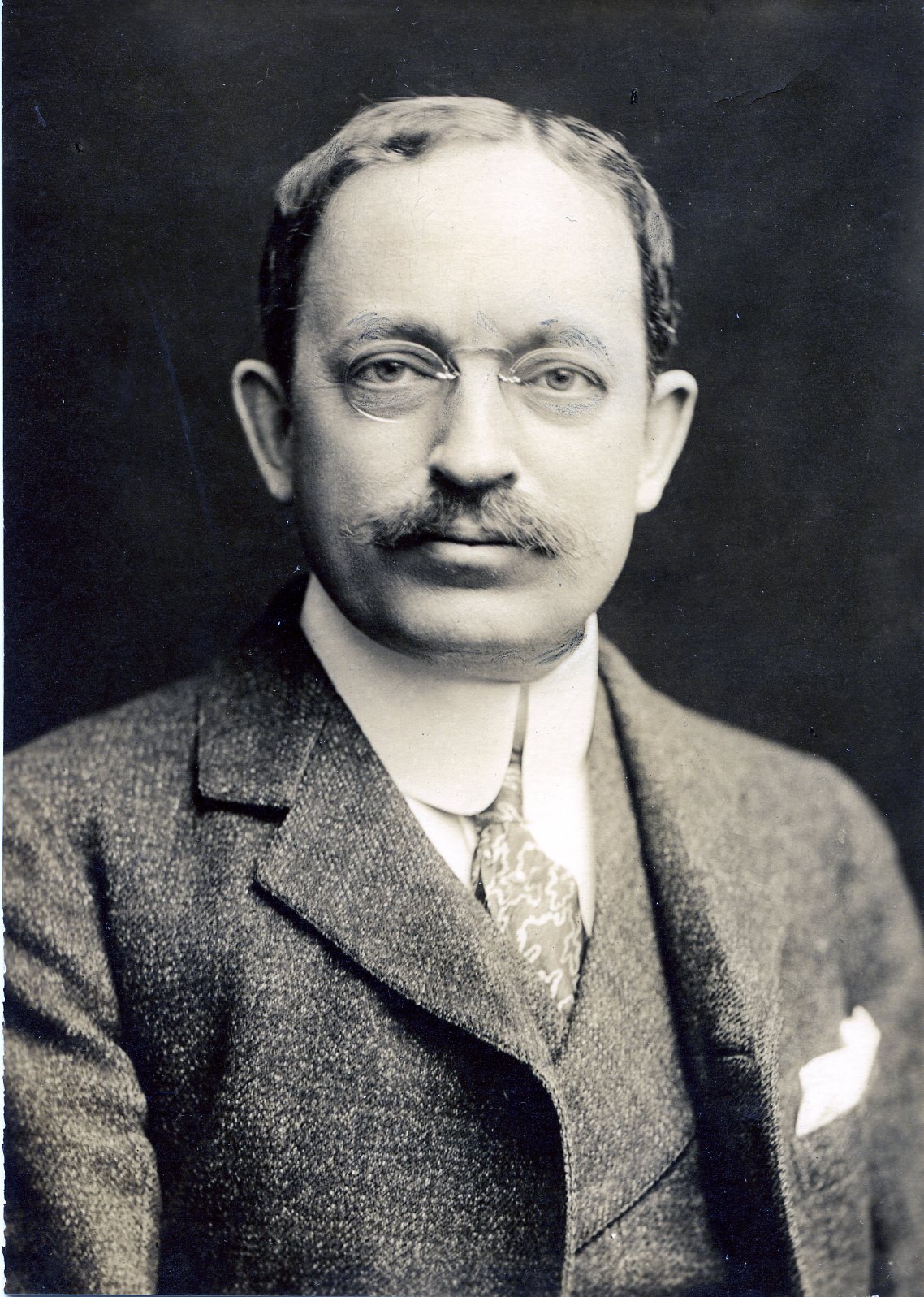 Thomas HastingsArchitectCenturion, 1891–1929
Thomas HastingsArchitectCenturion, 1891–1929 -
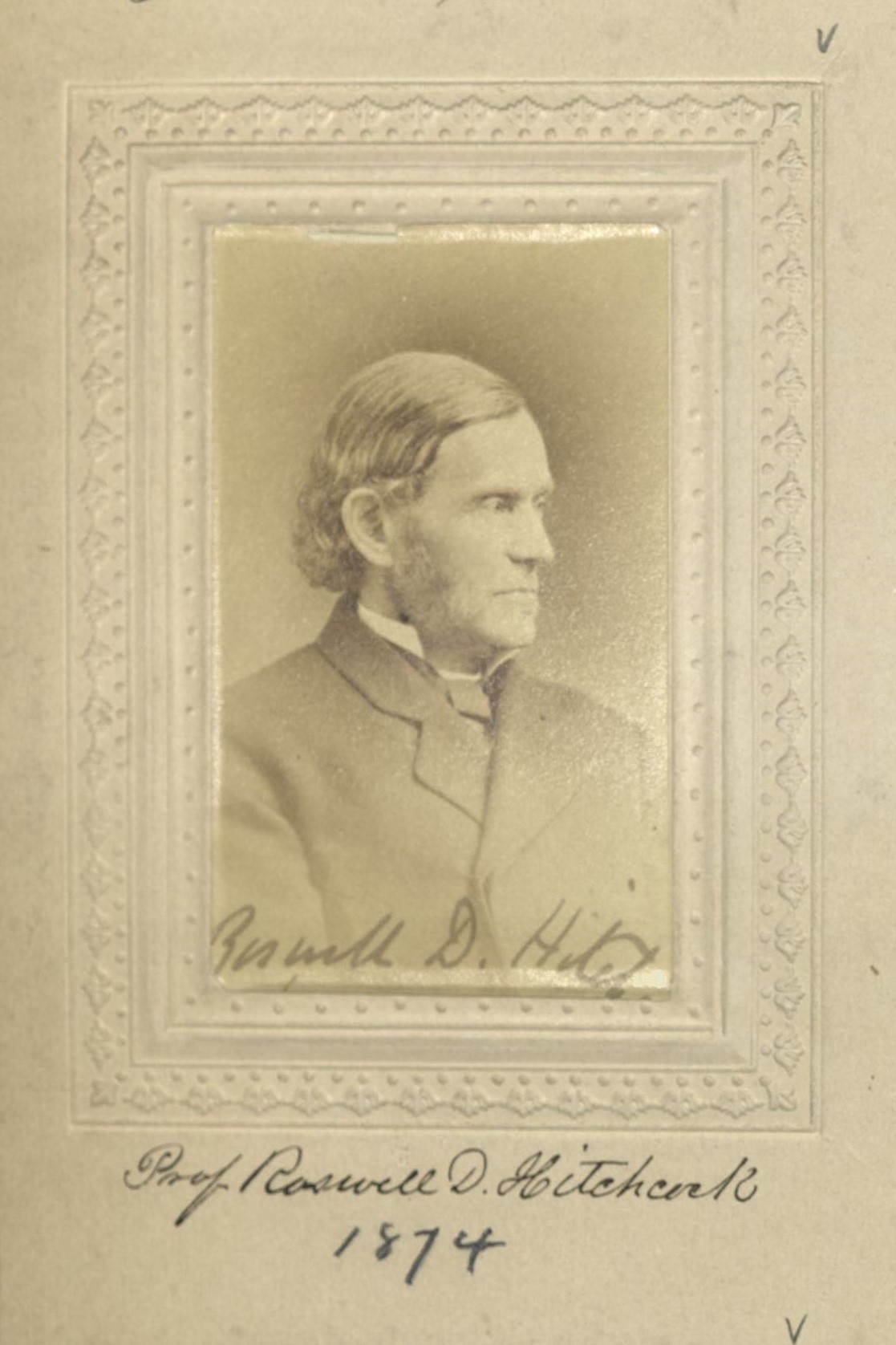 Roswell D. HitchcockClergymanCenturion, 1874–1887
Roswell D. HitchcockClergymanCenturion, 1874–1887 -
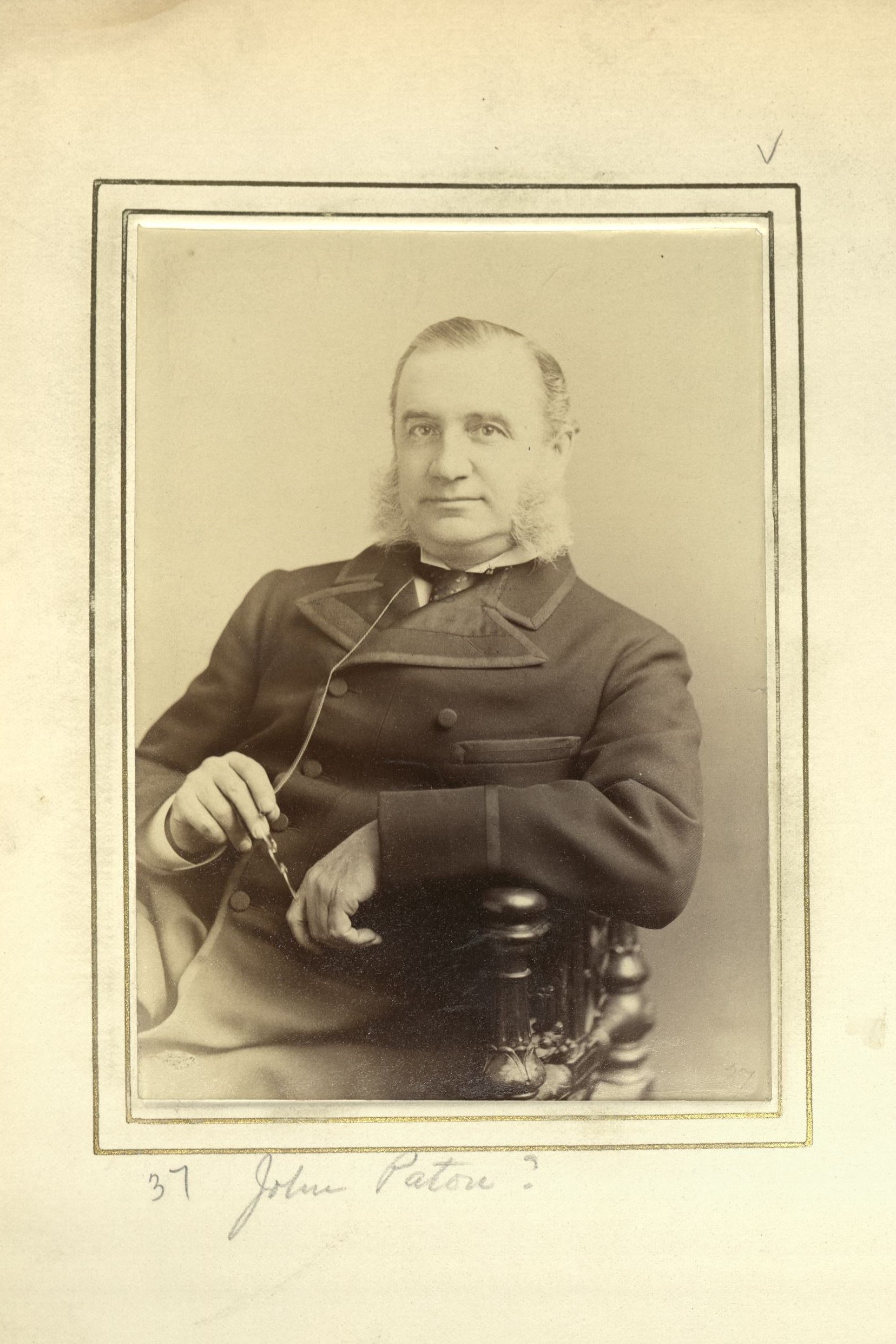 John PatonBankerCenturion, 1893–1899
John PatonBankerCenturion, 1893–1899





